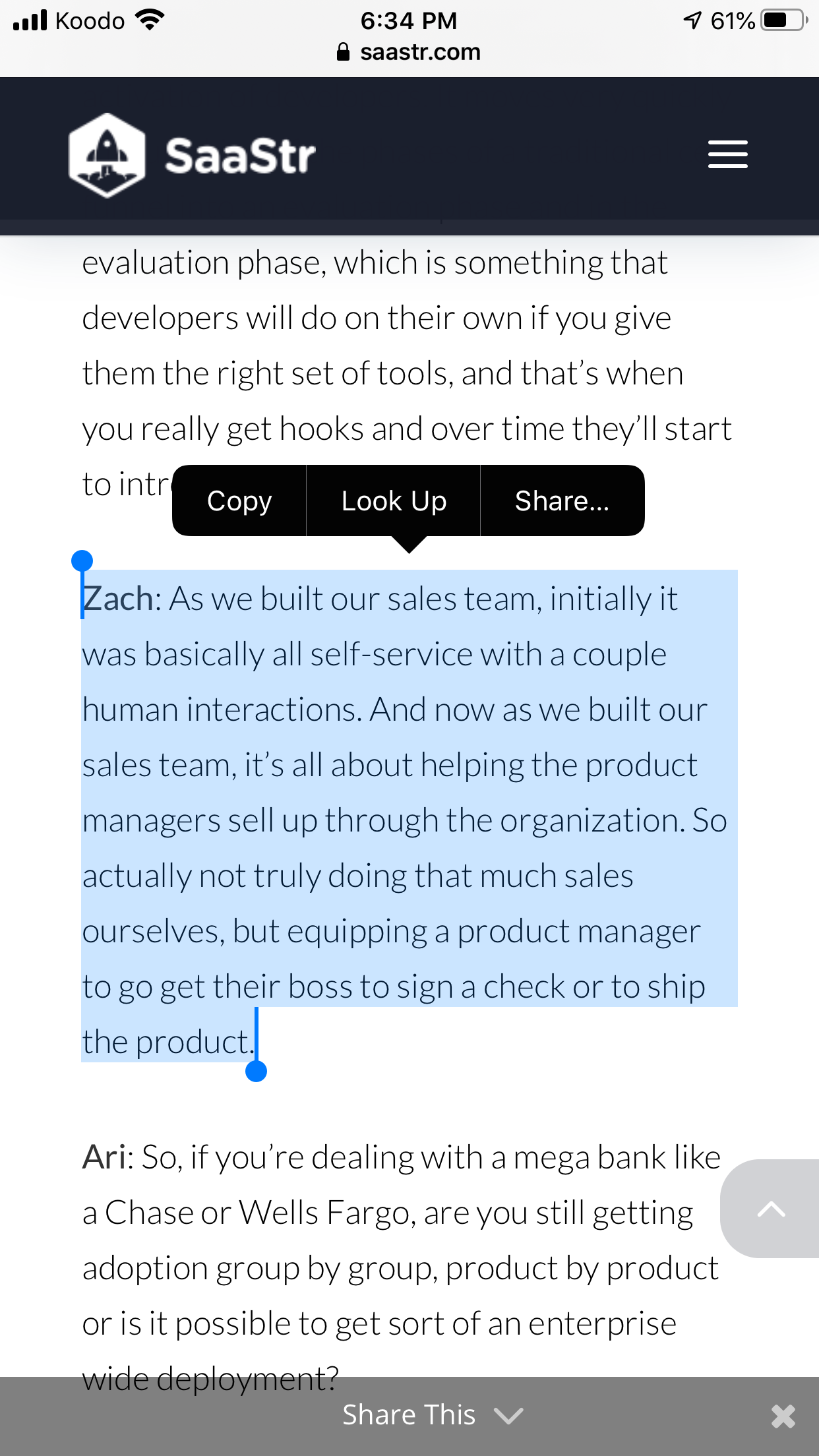I picked up Behind the Cloud - the Salesforce story a week or so ago. It’s an interesting read despite the general ‘we did everything right’ tone. Salesforce & Marc B have built a billion-dollar (163.31B) company so you are allowed, hell even expected to be smug about it.
One of the most interesting takeaways was that Salesforce started as the nimble startup disrupting Siebel & enterprise software marketing, but today they themselves have become the 10,000-pound gorilla.
To borrow from Batman (Chris Nolan) You either get acquired or live long enough to go public & become the 10,000-pound gorilla. Another example (close to home) is Shopify. They’ve created a marketing (along with Magento) but have slowly evolved into the platform everyone wants to chip away at. Elliot is an example.

I am not in the eCommerce space but I follow it relatively closely (along with Media) & Elliot has been shouting & poking at Shopify (they are a 3/4 person company) - mainly around pricing. It’s the story we’ve seen play out in the ‘website/CMS’ space - WordPress displaced HTML tables, Squarespace displaced a sub-segment of WordPress customers who needed more simplicity & fewer complications & now Webflow is taking up the middle ground b/w WordPress & Squarespace.
The other thing that struck me was how much of Drift’s early marketing was similar to Salesforce (no forms / no software, mock protests [that went south] & the PR / celebrity founder). Drift has since likely realized forms aren’t evil, are better for some things & aren’t going anywhere so they’ve changed their core messaging to real-time fulfillment [Now].
More on Away - Steph is now the Co-CEO. If she was a dude, this conversation would be different & I am still baffled the other co-founder hasn’t spoken up or said anything about it at all. Sales have not gone down - luggage still sells with good aspirational branding around it.

This is something I’ve thought about too (myself + for client/in-house roles) - the person doing the search is searching for something in their context but not necessarily using search modifiers but in some cases (local) you want specific ‘near me’ or ‘in Toronto’ etc. But again in some cases (I work with Knak that’s an Email Builder for MAPs) its very specific to ‘Marketo Email Templates’ etc.
I will say this though - bidding on general terms while trying to capture a specific (vertical/industry etc) demand is hard. You need to actively negative keyword out a lot of the search terms to help spend/bid on the most relevant ones.
Closing thought on this - this is why you need multiple channels/strategies. For example, Facebook can be used to reach coffee owners who are most likely in the market for an email marketing tool for their coffee shop or similarly for Display ads (often overlooked) to help get your brand in front of the right people when they might not actively be looking to buy.
5.3 Billion. Chump change for Visa (448.51B MKT CAP) but man, it’s an incredible buy. Plaid builds APIs that let your Mint talk to your bank account and they’re not the sexy front-facing / b2b / end user-startup. They sell to developers but they create the plumbing for fin-tech & now Visa owing those pipes gives them a ton of leverage + possible acquisition into fin-tech.


More on plaid:

source: https://www.saastr.com/build-a-platform-ecosystem/
Tech-enabled Marketplaces. Atrium laid off all (?) their on-staff lawyers. I wrote about it previously (?) but here’s a great conversation I had with Amrita (Superside / another tech-enabled marketplace) on that.


Shopify (as expected) launched a small financing program for commerce store built on their platform


It’ll be interesting to see this play out over time & to see if it grows. There are lots of online lenders and a handful focused on commerce/DTC brands (Clearbanc - Canadian) - what I find interesting is that likely 90% of this money is going to ads + Shopify in the first place.
Clearbanc (if I am not mistaken) uses Shopify data as part of its mix to determine who to loan to, with Shopify owning the platform + financing it makes a ton of sense. Stripe has Stripe Capital, Square as something similar. When you own the ‘source’ you essentially have a monopoly to build/expand your services/product portfolio putting those who build on top at risk (circa 2000’s Facebook vs Zynga & other social apps).
A good listen - Lerer Hippeau investor Caitlin Strandberg: Venture funding isn't to be spent on Facebook ads - the interesting bit was - most DTC companies are ‘marketing’ companies because the product is similar/the same & the core differentiator is brand/marketing.
Merci is a incredible thinker. She ran Product at Slack before moving to VC & boy this long read is worth it.
“Managers are often the people who purchase tools but they are not great early core customers: they have a lot to lose by pushing a tool that doesn’t take off and they don’t share the day-to-day problems of their team.”


Some parallels to Martech. Everyone & I mean EVERYONE say’s ‘OUR ICP IS VP OF MARKETING OR SALES’ but the end user who actually WILL use the tool day in & day out gets ignored. Selling to executives in crowded. Start with the marketing managers / bdrs - sell to them. Make their life better & let them be advocates. Easier said than done but something to think about.
I am not a Calm/HeadSpace user & ‘mental fitness’ to me just means 10 hours of sleep but an interesting conversation here:


Food for thought:
I rarely used to talk about my work - now its a ‘sales channel for me.


This thread by Pete is awesome. Lots of learning for me as a consultant/agency who goes from hourly billing - retainers - project work & now balancing retainer/project work.
Another lesson - empower your partners. So many companies that want to talk to me about partnerships end up being me being an outsourced sales guy with a quota.

Watch:
Zoom’s story & the fact this guy is sitting on the biggest stage in SaaS and has an accent really spoke to me.
The soundtrack for this edition was Queen.
Till next time!
Kamil




